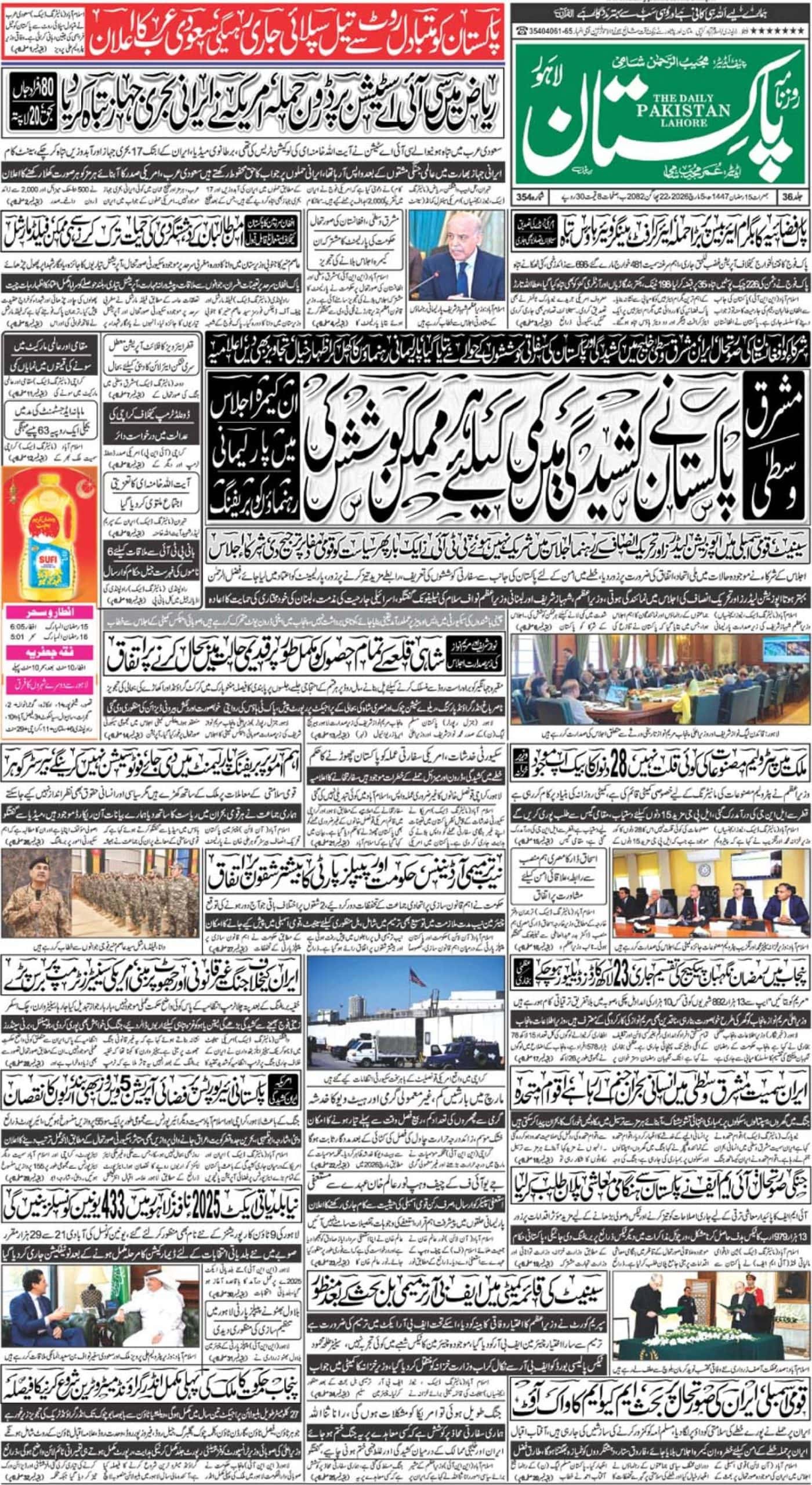ISLAMABAD – Thirty-four days before its five-year term ends on May 31, the incumbent government will present its sixth consecutive Federal Budget for the next financial year in National Assembly with an estimated outlay of Rs 5.5 trillion on Friday (today).
The National Assembly has been summoned to meet at 16:30 hours for presentation of the federal budget.
Advisor to Prime Minister on Finance Miftah Ismail will present the budget where tax revenue target would be around Rs 4.5 trillion.
As per details, defense budget size would be proposed to nearly Rs 1.050 trillion, whereas, an amount of Rs 1.550 trillion is likely to be allocated to service debt and principal payment.
The government is expected to propose an increase of 10 to 15 percent in pension and salaries. Besides this Rs220 billion will be earmarked for subsidies. Subsidies would be given to power, textile, water, for construction of small dams, Ramzan package and wheat to be provided to Gilgit and Baltistan.
For the development projects, the federal and provincial governments are expected to spend Rs 1010 billion and Rs 1030 billion respectively.
Moreover, the government is likely to give nearly Rs 2565 billion to provinces which will be consumed for social safety, reduction in poverty, health and education sectors.
Salient Features:







The budget will lend focus on improving economic growth, maintaining fiscal discipline, boosting exports besides providing relief to the masses and promoting investment for job creation.
It will also focus on social sector development and revenue enhancement measures.
On the revenue side, the government would introduce measures for bringing improvement in the system of tax collection, broadening the tax base, and facilitation to taxpayers.
People often get confused by the jugglery of numbers in the budget speech. Here’s what you need to watch out for to assess the impact and form an opinion:

Federal Budget 2018-19 to be more responsible: Miftah Ismail
Adviser to the Prime Minister on Finance Dr Miftah Ismail said that the government was set to present a balanced, responsible, and low deficit Federal Budget for the year 2018-19 on Friday (April 27).
“We will present a responsible budget that will be acceptable to any upcoming government,” he said while talking to a private news channel.
To a question regarding opposition’s demand for presenting the budget for only three months, Miftah said it was totally irrational and not workable.
“We will need a foreign loan of around $1.8 billion during the next year so how can we make a commitment with the international financial institutions for only three months,” he said adding for mega projects like Diamir Bhasha Dam, it was not possible to allocate budget for three months only.
Similarly, he said, changes in tax regime and increase in salaries of government employees also could not be announced for only one quarter of the year.
“They (opposition) know these things but they were doing politics on the issue,” he added.
He said about a month ago, he met leaders of the PTI and PPP Sheerin Mazari, and Naveed Qamar in the Speaker’s Chamber where both of them agreed to present the budget, but now he did not know as to why they were opposing the matter.
Miftah Ismail said after meeting with the PPP and PTI leaders, the federal government wrote letters to chief ministers of all the provinces to start preparations for the budget 2018-19.
To a question regarding allocation for various projects under Public Sector Development Programme (PSDP), he said that most of them were old projects.
Miftah said keeping in view the upcoming general election, the government deliberately kept a relatively low volume of the federal PSDP 2018-19 and left a space of around 70 to 80 billion rupees for the new government, which could introduce new projects of its own choice. The PSDP was not the mandate of National Economic Council (NEC), but it was to be approved by the Parliament, he added.
Experts’ predictions about the next budget: (Courtesy Dawn)

Dr Hafiz A. Pasha , Economist
The budgetary process has tended to go out of control in recent months. By the end of the current fiscal year, the consolidated fiscal deficit is likely to approach 6.5pc of GDP, compared to the deficit target of 4.1pc of the GDP. The expansionary nature of the on-going fiscal policy is inevitably adding to aggregate demand and putting pressure on the import bill, thereby exacerbating the problem of a large and growing current account deficit.
Given these conditions, it is indeed surprising that the lame duck government still wants to present the sixth budget at the fag end of its tenure. The reasonable expectation is that the budget strategy in 2018-19 must be to bring down sharply the deficit back to about 4.5pc of the GDP. This would necessitate unpopular taxation measures and expenditure cuts on the eve of the elections. This task could better have been left to the successor government.

Dr Faisal Bari, CEO, Ideas
The budget can be expected to be expansionary. Since elections are around the corner, this government has an incentive to increase expenditures so as to woo voters.
The increases in expenditure will come in the form of sizable increases in salaries of government employees, increase in pensions and announcements of various sorts of ‘relief’ measures. The government has already announced substantial cuts in individual income tax rates. These will also be reflected while it is unlikely to impose any new taxes in this budget.
The result of the above will be increased the budgeted fiscal deficit for next year. The government will justify it by saying that it is using expansionary policy to ensure that GDP growth targets are met and the rising growth rate does not falter and fall again.
The next government that comes in, post-election, might have to bring adjustments to the budget that this government presents. Increasingly binding fiscal constraints might force the next government to reverse some of the expansionary policies this government is likely to announce. But it will not be easy to reverse all changes as doing so will make the incoming government lose popularity.

Dr Nadeem ul Haque, Former Deputy Chairman, P&D
The government has no commitment towards the budget. It cannot have any commitment towards it because it won’t be implementing it. A new government will. Besides whatever changes had to be made were made with the amnesty announcement which was a mini-budget of its own. It’s very convenient to issue a budget but the new government that comes will change it. In any case, the country will enter the IMF programme sooner or later and then a new budget will be announced to support it. This budget is no big deal. It has no meaning at all.














